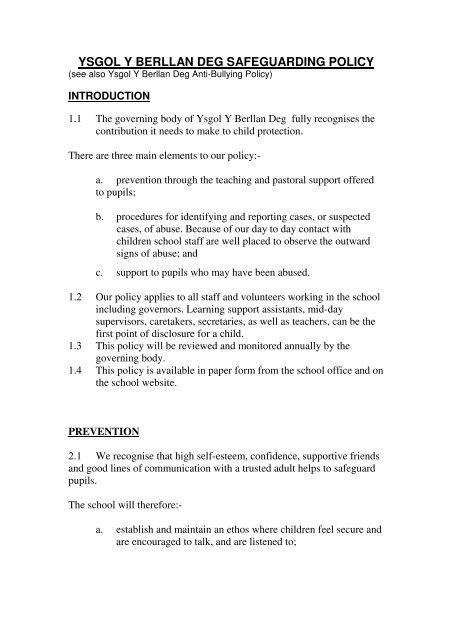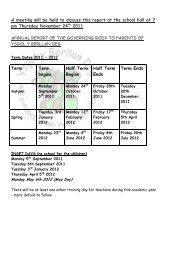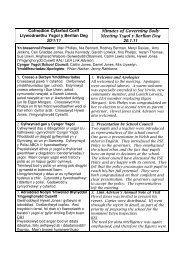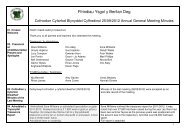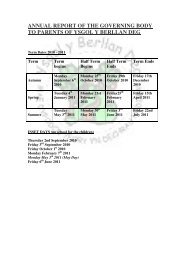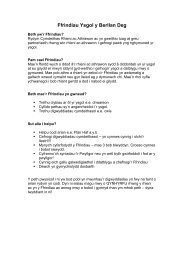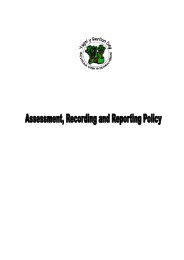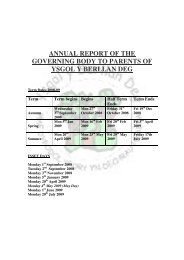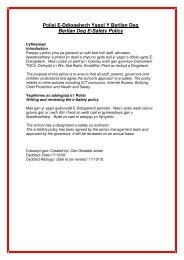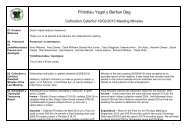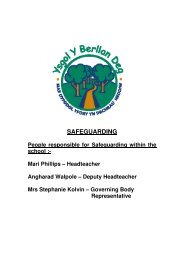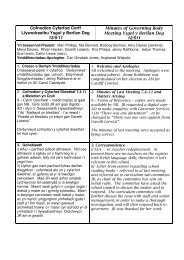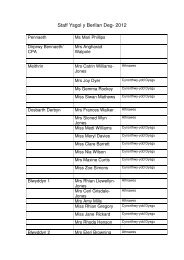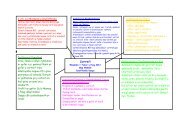YSGOL Y BERLLAN DEG SAFEGUARDING POLICY
YSGOL Y BERLLAN DEG SAFEGUARDING POLICY
YSGOL Y BERLLAN DEG SAFEGUARDING POLICY
Create successful ePaper yourself
Turn your PDF publications into a flip-book with our unique Google optimized e-Paper software.
<strong>YSGOL</strong> Y <strong>BERLLAN</strong> <strong>DEG</strong> <strong>SAFEGUARDING</strong> <strong>POLICY</strong><br />
(see also Ysgol Y Berllan Deg Anti-Bullying Policy)<br />
INTRODUCTION<br />
1.1 The governing body of Ysgol Y Berllan Deg fully recognises the<br />
contribution it needs to make to child protection.<br />
There are three main elements to our policy:-<br />
a. prevention through the teaching and pastoral support offered<br />
to pupils;<br />
b. procedures for identifying and reporting cases, or suspected<br />
cases, of abuse. Because of our day to day contact with<br />
children school staff are well placed to observe the outward<br />
signs of abuse; and<br />
c. support to pupils who may have been abused.<br />
1.2 Our policy applies to all staff and volunteers working in the school<br />
including governors. Learning support assistants, mid-day<br />
supervisors, caretakers, secretaries, as well as teachers, can be the<br />
first point of disclosure for a child.<br />
1.3 This policy will be reviewed and monitored annually by the<br />
governing body.<br />
1.4 This policy is available in paper form from the school office and on<br />
the school website.<br />
PREVENTION<br />
2.1 We recognise that high self-esteem, confidence, supportive friends<br />
and good lines of communication with a trusted adult helps to safeguard<br />
pupils.<br />
The school will therefore:-<br />
a. establish and maintain an ethos where children feel secure and<br />
are encouraged to talk, and are listened to;
. ensure children know that there are adults in the school whom<br />
they can approach if they are worried or in difficulty (see<br />
Ysgol Y Berllan Deg Anti-Bullying Policy);<br />
c. include in the curriculum, activities and opportunities for PSE<br />
which equip children with the skills they need to stay safe<br />
from abuse and to know who to turn for help; and<br />
d. include in the curriculum, material which will help children<br />
develop awareness of the responsibilities of adult life,<br />
particularly with regard to childcare and parenting<br />
responsibilities.<br />
PROCEDURES<br />
3.1 We follow the All Wales Child Protection Procedures that have<br />
been endorsed by the Local Safeguarding Children Board.<br />
3.2 The school will:-<br />
a. ensure it has a designated senior member of staff, who has<br />
undertaken the appropriate training;<br />
b. recognise the role of the designated person and arrange<br />
support and training.<br />
c. ensure every member of staff and every governor knows:-<br />
- the name of the designated person and their role;<br />
- that they have an individual responsibility for referring<br />
child protection concerns using the proper channels and<br />
within the timescales agreed with the Local Safeguarding<br />
Children Board; and<br />
- how to take forward those concerns where the designated<br />
person is unavailable;<br />
d. ensure that members of staff are aware of the need to be alert<br />
to signs of abuse and know how to respond to a pupil who<br />
may disclose abuse;<br />
e. ensure that parents have an understanding of the responsibility<br />
placed on the school and staff for child protection by setting<br />
out its obligations in the school prospectus;<br />
f. provide annual training for all staff so that they know:-
i. their personal responsibility;<br />
ii. the agreed local procedures;<br />
iii. the need to be vigilant in identifying cases of abuse; and<br />
iv. how to support a child who discloses abuse.<br />
g. always notify the local social services team within 24 hours<br />
if:-<br />
- a pupil on the child protection register is excluded either<br />
for a fixed term or permanently; and<br />
- if there is an unexplained absence of a pupil on the child<br />
protection register of more than two days’ duration from<br />
school (or one day following a weekend);<br />
h. work to develop effective links with relevant agencies and cooperate<br />
as required with their enquiries regarding child<br />
protection matters, including attendance at initial review, child<br />
protection conferences and core group meetings and the<br />
submission of written reports as required.<br />
i. keep written records of concerns about children (noting the<br />
date, event and action taken), even where there is no apparent<br />
need to refer the matter to social services immediately;<br />
j. ensure all records are kept secure and in locked locations;<br />
k. adhere to the procedures set out in the Welsh Assembly<br />
Government guidance circular 45/2004 Staff Disciplinary<br />
Procedures in Schools ;<br />
l. ensure that recruitment and selection procedures are made in<br />
accordance with Welsh Assembly Government guidance<br />
circular 34/2002 and<br />
m. designate a governor for child protection who will oversee the<br />
school’s child protection policy and practice<br />
n. pay particular attention to any child on the at risk register<br />
SUPPORTING THE PUPIL AT RISK<br />
4.1 We recognise that children who are at risk, suffer abuse or witness<br />
violence may be deeply affected by this.
4.2 This school may be the only stable, secure and predictable element<br />
in the lives of children at risk. Nevertheless, when at school their<br />
behaviour may be challenging and defiant or they may be<br />
withdrawn.<br />
4.3 The school will endeavour to support the pupil through:-<br />
a. the content of the curriculum, to encourage self esteem and<br />
self motivation (see section 2 on Prevention and Ysgol Y<br />
Berllan Deg Anti-Bullying Policy);<br />
b. the school ethos which promotes a positive, supportive and<br />
secure environment; and gives pupils a sense of being valued<br />
(see section 2 on Prevention);<br />
c. the school's Discipline Policy is aimed at supporting<br />
vulnerable pupils in the school. All staff will have a consistent<br />
approach which focuses on the behaviour of the offence<br />
committed by the child but does not damage the pupil's sense<br />
of self-worth. The school will endeavour to ensure that the<br />
pupil knows that some behaviour is unacceptable, but s/he is<br />
valued and not blamed for any abuse which has occurred;<br />
d. liaison with other agencies who support the student such as<br />
Social Services, Child and Adolescent Mental Health<br />
Services, the Educational Psychology Service, Behaviour<br />
Support Services and the Education Welfare Service; and<br />
e. keeping records and notifying Social Services as soon as there<br />
is a recurrence of a concern;<br />
4.4 When a pupil on the child protection register leaves, we will<br />
transfer information to the new school immediately and inform Social<br />
Services.<br />
Bullying<br />
4.5 Our policy on bullying is set out in the school’s Anti Bullying<br />
Policy and is reviewed by the governing body<br />
Children with Statements of Special Educational Needs<br />
4.6 We recognise that statistically children with learning and<br />
behavioural difficulties are particularly vulnerable to abuse. School<br />
staff who deal with children with profound and multiple
disabilities, sensory impairment or emotional and behaviour<br />
problems need to be particularly sensitive to signs of abuse.<br />
<strong>YSGOL</strong> Y <strong>BERLLAN</strong> <strong>DEG</strong> – GUIDANCE FOR STAFF<br />
Where the allegation is against a member of staff you should tell the<br />
Headteacher immediately who will then contact the Chair of Governors.<br />
If the allegation is against the Headteacher you must report the incident to<br />
the Chair of Governors (see the Welsh Assembly Government guidance<br />
circular 45/2004).<br />
What to do if a child tells you they have been abused by someone<br />
other than a member of staff<br />
A child may confide in any member of staff and may not always go to a<br />
member of the teaching staff. Staff to whom an allegation is made should<br />
remember:-<br />
• yours is a listening role; do not interrupt the child if he or she is<br />
freely recalling significant events. Limit any questions to<br />
clarifying your understanding of what the child is saying. Any<br />
questions should be framed in an open manner so as not to lead<br />
the child;<br />
• you must report orally to the school’s designated person for child<br />
protection, Ms Mari Phillips (Headteacher) immediately or Mrs<br />
Angharad Walpole (Deputy) in the Headteacher’s absence. The<br />
designated governor responsible for child protection is Ms Jenny<br />
Rathbone.<br />
• make a note of the discussion, as soon as is reasonably<br />
practicable (but within 24 hours) to pass on to the school’s<br />
designated person for child protection. The note which should<br />
be clear in its use of terminology should record the time, date,<br />
place and people who were present and should record the<br />
child’s answers/responses in exactly the way they were said as<br />
far as possible. Remember, your note of the discussion may be<br />
used in any subsequent court proceedings;<br />
• do not give undertakings of absolute confidentiality;
• that a child may be waiting for a case to go to the criminal<br />
court, may have to give evidence or may be awaiting care<br />
proceedings; and<br />
• your responsibility in terms of referring concerns ends at this<br />
point, but you may have a future role in terms of supporting or<br />
monitoring the child, contributing to an assessment or<br />
implementing child protection plans.<br />
The designated child protection person at the school should clarify and<br />
agree with relevant statutory agencies, when, how and by whom, the<br />
parents or carers will be told about any referral. They should also seek<br />
advice as to whether or not the child should be informed of the process.<br />
Confidentiality<br />
A child may say they only feel confident to confide in a member of staff<br />
if they feel that the information will not be divulged to anyone else.<br />
However, education staff have a professional responsibility to share<br />
relevant information about the protection of children with the<br />
designated statutory agencies when a child is experiencing child welfare<br />
concerns.<br />
It is important that each member of staff deals with this sensitively and<br />
explains to the child that they must inform the appropriate people who<br />
can help the child, but that they will only tell those who need to know in<br />
order to be able to help. They should reassure the child and tell them that<br />
their situation will not become common knowledge within the school. Be<br />
aware that it may well have taken significant courage on their part to<br />
disclose the information and that they may also be experiencing<br />
conflicting emotions, involving feelings of guilt, embarrassment,<br />
disloyalty (if the abuser is someone close) and hurt.<br />
Please remember the pastoral responsibility of the education service.<br />
Ensure that only those with a professional involvement, e.g. the child’s<br />
class teacher, designated senior person and the Headteacher, have access<br />
to the child protection records. At all other times they should be kept<br />
securely locked and separate from the child’s main file.<br />
The designated child protection person for this school is Ms M. Phillips,<br />
(Headteacher), and Angharad Walpole (Deputy) in her absence. The
designated governor responsible for child protection is Ms Jenny<br />
Rathbone.<br />
See list below for relevant websites / helplines which could be of help.<br />
Childline<br />
A free 24-hour advice line offering counselling and support to young<br />
people suffering from abuse. The call won’t show up on your phone bill.<br />
0800 11 11<br />
www.childline.org.uk<br />
NSPCC<br />
A free phone line offering support and advice to young people in abusive<br />
or difficult situations. The lines are open 24 hours a day and the calls<br />
won’t show up on your phone bill.<br />
0808 800 5000<br />
www.nspcc.org.uk<br />
Funky Dragon<br />
Funky Dragon is a peer-led organisation that aims to make sure the views<br />
of<br />
0 – 25 year olds are heard, particularly by the Welsh Assembly<br />
Government.<br />
www.funkydragon.org.uk<br />
Children’s Commissioner for Wales<br />
Children’s Champion – Independent human rights institution for children.<br />
0808 801 1000. The lines are open from 9am to 5pm (Monday to Friday).<br />
www.childcom.org.uk<br />
Clic<br />
The National Information and Advice Service for young people in Wales<br />
11 to 25.<br />
www.cliconline.co.uk<br />
Samaritans<br />
Free and confidential advice and support<br />
08457 90 90 90<br />
www.samaritans.org.uk
Barnardo’s<br />
Barnardo’s works with vulnerable children and young people, helping<br />
them and their families to overcome problems like abuse, homelessness<br />
and poverty.<br />
020 8550 8822 (national rate, 8am–6pm Mon – Fri)<br />
www.barnardos.org.uk<br />
BBC One Life<br />
This website provides advice on children and young people’s rights, what<br />
to do if they are being abused and how to get help.<br />
www.bbc.co.uk/surgery<br />
Kidscape<br />
Kidscape works with children and young people under the age of 16, their<br />
parents/carers and those who work with them to prevent bullying and<br />
child sexual abuse.<br />
08451 205 204<br />
www.kidscape.org.uk<br />
Get Connected<br />
Get Connected provides a free, confidential helpline that gives young<br />
people in difficult situations support and information.<br />
0808 808 4994<br />
www.getconnected.org<br />
Bullying Online<br />
Bullying Online is a website that provides information and support for a<br />
wide range of parents, pupils, teachers and youth organisations.<br />
www.bullying.co.uk<br />
Wise Kids<br />
Wise Kids is a website that provides information and support on internet<br />
literacy, proficiency and knowledge of the intranet and related<br />
technologies.<br />
www.wisekids.org.uk
<strong>YSGOL</strong> Y <strong>BERLLAN</strong> <strong>DEG</strong><br />
MODEL NOTE FOR PARENTS OR CARERS<br />
Parents/carers should be aware that schools have a responsibility to<br />
ensure the well-being of all pupils. This responsibility means that the<br />
school:-<br />
• has a Child Protection Policy and procedures it must adhere to;<br />
this is posted on the school’s website and is available from the<br />
school office on request;<br />
• will make parents or carers aware that their child could be<br />
referred to statutory child welfare agencies if the school<br />
believes that the child or other children may be at risk of<br />
significant harm;<br />
• will endeavour to work with parents/carers regarding the<br />
welfare of their child and remain impartial if their child is<br />
being, or has been referred;<br />
• will help parents or carers understand that if a referral is made<br />
to social services or the police, it has been made in the best<br />
interests of the child and that the school will be involved in any<br />
child protection enquiry or police investigation in relation to<br />
their child’s welfare and educational progress; and<br />
• keep the parents or carers informed of the welfare and<br />
educational progress of the child.<br />
Where a professional has a concern about a child, they will, in general,<br />
seek to discuss this with the family and, where possible, seek their<br />
agreement to making a referral to social services. However, this will only<br />
be done where such a discussion and agreement will not place a child at<br />
increased risk of significant harm. This will depend on the advice<br />
provided by the local social services department in consultation, where<br />
appropriate, with the police.
As a parent or carer you may sometimes feel alone but there is usually<br />
somebody you can talk to. Caring for children is not always easy and if<br />
you’re struggling to cope you may need to ask for help and support to<br />
protect your child.<br />
You may find the following helpful:-<br />
make time to talk and listen to your child ;<br />
familiarise yourself with your child’s friends and routine;<br />
be sensitive to changes in behaviour;<br />
teach your child to feel confident to refuse to do anything they feel<br />
is wrong;<br />
be aware of your child’s use of the internet and mobile phone to<br />
ensure they don’t place themselves at risk.
<strong>YSGOL</strong> Y <strong>BERLLAN</strong> <strong>DEG</strong><br />
MODEL NOTE FOR PUPILS<br />
If someone is hurting you or your friends, there are people who can help<br />
you and stop people from making you feel scared or hurt.<br />
You should tell someone you trust:-<br />
• you can tell a teacher, your parents, carers, or other members of<br />
your family who may be able to help, or can tell a friend; and<br />
• let people help to make things better by stopping the person<br />
from hurting you or your friends.<br />
The person in this school who has special responsibility for helping you if<br />
someone’s hurting you or your friends is Mrs Angharad Walpole,<br />
Deputy Headteacher.<br />
If you can’t talk to any of these, you can talk to one of the following<br />
organisations that will have someone who will listen to you:-<br />
Childline<br />
A free 24-hour advice line offering counselling and support to young<br />
people suffering from abuse. The call won’t show up on your phone bill.<br />
0800 11 11<br />
www.childline.org.uk<br />
Kidscape<br />
Kidscape works with children and young people under the age of 16, their<br />
parents/carers and those who work with them to prevent bullying and<br />
child sexual abuse.<br />
08451 205 204<br />
www.kidscape.org.uk


